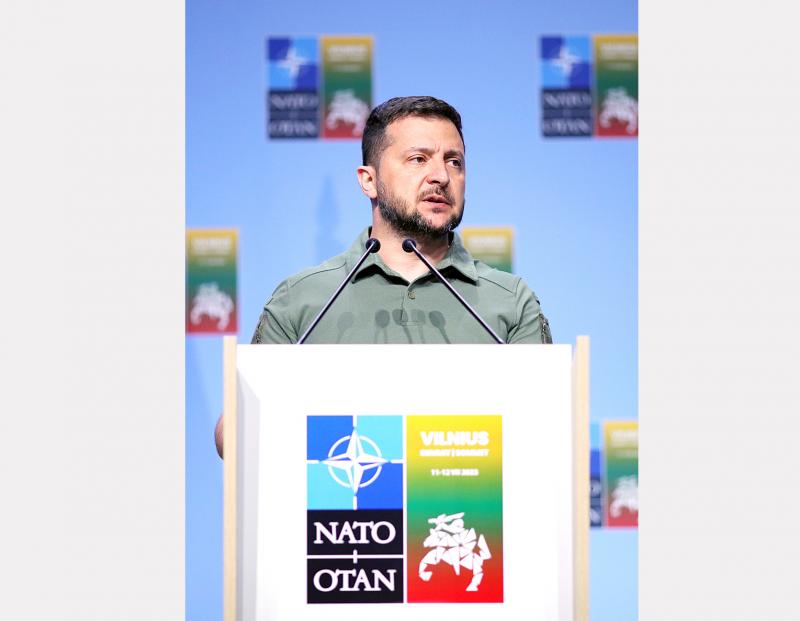Ukrainian President Volodymyr Zelenskiy yesterday welcomed new security guarantees from Western powers, but said that, in the face of the Russian invasion, they would be no substitute for eventual NATO membership.
On the last day of NATO’s Vilnius summit, the G7 group of major powers made a long-term pledge of support to help Ukraine defeat the Russian threat and to deter future aggression after the war ends.
This was enough to draw a furious condemnation from the Kremlin, but not sufficient to meet the ambitions of Zelenskiy, who traveled to the Lithuanian capital seeking an invitation and clear timetable for Ukraine to join the Atlantic alliance.

Photo: EPA-EFE
“The best guarantee for Ukraine is to be in NATO,” Zelenskiy said, expressing confidence that once the war is over Ukraine would be welcomed, but saying that the G7 guarantees should be seen “not instead of NATO, but as security guarantees on our way to integration.”
The 31 NATO leaders had on Tuesday said that Ukraine would get an invite when they agreed that all “conditions are met.”
Zelenskiy explained this by saying: “I understand this as ‘when it will be safe on our land.’”
NATO Secretary-General Jens Stoltenberg was sympathetic to Zelenskiy’s position, but stressed the importance of the progress he said Ukraine had made at the summit.
Zelenskiy was joining NATO leaders at an inaugural meeting of the Ukraine-NATO Council, and said several allies were boosting bilateral assistance, such as France with a pledge of long-range missiles and the Netherlands leading a coalition to train fighter pilots, Stoltenberg said.
“Today, we meet as equals, I look forward to the day we meet as allies,” Stoltenberg said.
In a joint statement seen by Agence France-Presse, the G7 — Canada, France, Germany, Italy, Japan, the UK and the US — said they would send weapons and support to help Ukraine defeat the ongoing Russian invasion and to deter any future attack once peace is secured.
“We will stand with Ukraine as it defends itself against Russian aggression, for as long as it takes,” the statement said.
US National Security Adviser Jake Sullivan told CNN that Ukraine could not join NATO right away, because it would be “an inescapable fact” that the treaty’s mutual defense clause would mean that the allies would be immediately in a direct war with Russia.
However, he said that “the G7 ... will stand up with President Zelenskiy to announce we’re prepared to provide that security assistance long out into the future, and certainly for the duration of the period while Ukraine is working its way on the pathway toward NATO.”
President Vladimir Putin’s spokesman Dmitry Peskov said, that the step “will make Europe much more dangerous for years and years.”

AIR SUPPORT: The Ministry of National Defense thanked the US for the delivery, adding that it was an indicator of the White House’s commitment to the Taiwan Relations Act Deputy Minister of National Defense Po Horng-huei (柏鴻輝) and Representative to the US Alexander Yui on Friday attended a delivery ceremony for the first of Taiwan’s long-awaited 66 F-16C/D Block 70 jets at a Lockheed Martin Corp factory in Greenville, South Carolina. “We are so proud to be the global home of the F-16 and to support Taiwan’s air defense capabilities,” US Representative William Timmons wrote on X, alongside a photograph of Taiwanese and US officials at the event. The F-16C/D Block 70 jets Taiwan ordered have the same capabilities as aircraft that had been upgraded to F-16Vs. The batch of Lockheed Martin

GRIDLOCK: The National Fire Agency’s Special Search and Rescue team is on standby to travel to the countries to help out with the rescue effort A powerful earthquake rocked Myanmar and neighboring Thailand yesterday, killing at least three people in Bangkok and burying dozens when a high-rise building under construction collapsed. Footage shared on social media from Myanmar’s second-largest city showed widespread destruction, raising fears that many were trapped under the rubble or killed. The magnitude 7.7 earthquake, with an epicenter near Mandalay in Myanmar, struck at midday and was followed by a strong magnitude 6.4 aftershock. The extent of death, injury and destruction — especially in Myanmar, which is embroiled in a civil war and where information is tightly controlled at the best of times —

Taiwan was ranked the fourth-safest country in the world with a score of 82.9, trailing only Andorra, the United Arab Emirates and Qatar in Numbeo’s Safety Index by Country report. Taiwan’s score improved by 0.1 points compared with last year’s mid-year report, which had Taiwan fourth with a score of 82.8. However, both scores were lower than in last year’s first review, when Taiwan scored 83.3, and are a long way from when Taiwan was named the second-safest country in the world in 2021, scoring 84.8. Taiwan ranked higher than Singapore in ninth with a score of 77.4 and Japan in 10th with

SECURITY RISK: If there is a conflict between China and Taiwan, ‘there would likely be significant consequences to global economic and security interests,’ it said China remains the top military and cyber threat to the US and continues to make progress on capabilities to seize Taiwan, a report by US intelligence agencies said on Tuesday. The report provides an overview of the “collective insights” of top US intelligence agencies about the security threats to the US posed by foreign nations and criminal organizations. In its Annual Threat Assessment, the agencies divided threats facing the US into two broad categories, “nonstate transnational criminals and terrorists” and “major state actors,” with China, Russia, Iran and North Korea named. Of those countries, “China presents the most comprehensive and robust military threat